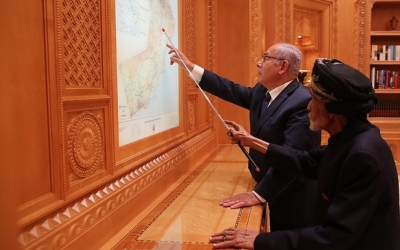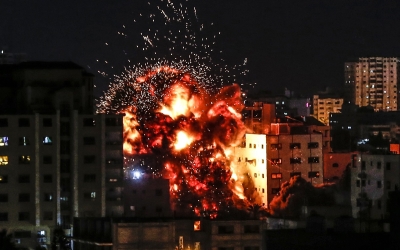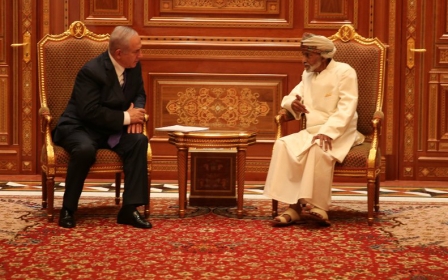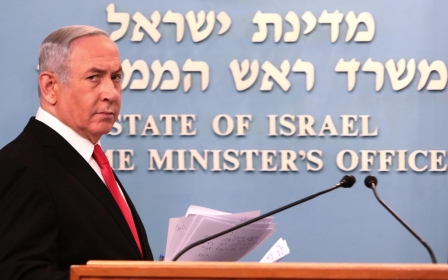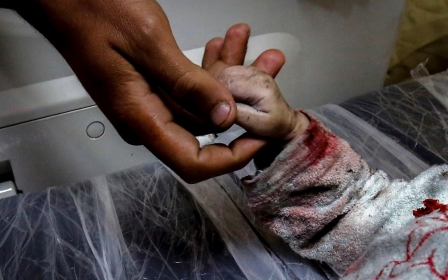Arrest of Palestinian in Gaza renews controversy over normalisation with Israel
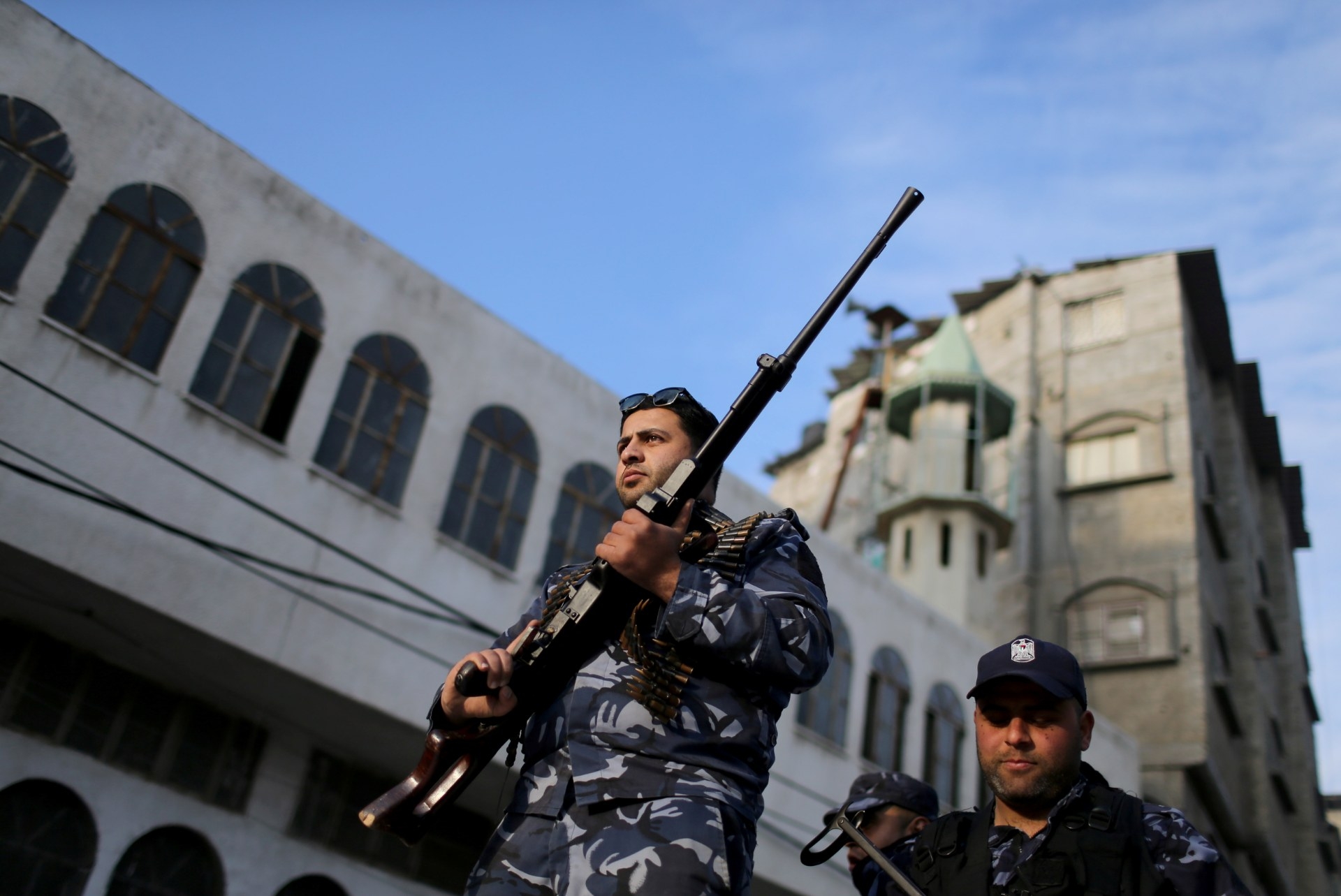
For Palestinians and their supporters, "normalisation" - warming relations with Israel and/or individual Israeli citizens - has long been a complex subject of controversy.
The issue has once again come back to the fore in the past week. The arrest of a Palestinian by authorities in the besieged Gaza Strip for organising a virtual call between Palestinians and Israelis caught the attention of international media - landing a Palestinian activist in the crosshairs of a social media campaign in the process for having publicly denounced the online meeting.
Stay informed with MEE's newsletters
Sign up to get the latest alerts, insights and analysis, starting with Turkey Unpacked
The case has highlighted both the longstanding debate on what relationship, if any, Palestinians in the Gaza Strip should have with Israelis amid decades of occupation, several wars and a crushing siege - and the nuances often lost in the process.
'Skype with your enemy'
On 6 April, Rami Aman, 38, and several other Palestinians from the besieged Gaza Strip organized a Zoom conference livestreamed on social media as part of an initiative entitled "Skype with your enemy".
For a decade, Aman has organised a number of events promoting interactions between Palestinians and Israelis with his organisation, the Gaza Youth Committee, as he has argued that the absence of communication between both sides has been a barrier to peace.
His activities have led Aman to be jailed and summoned for interrogation on a number of occasions over the years in addition to attracting plenty of criticism.
On the morning of 9 April, three days after the virtual call, Hind Khoudary, a Palestinian journalist from the Gaza Strip and former Middle East Eye contributor, wrote a Facebook post reacting to the event.
In her post - which has since been removed by Facebook, Khoudary took issue with Aman and other organisers, calling them "persons from Gaza who normalise with the [Israeli] occupation."
"Hopefully, this nonsense ends as soon as possible," she wrote, before tagging officials from Hamas, the de facto ruling party in Gaza, in her post.
That same day, Gaza security forces detained Aman and several others for "holding a normalisation event with the Israeli occupation on the internet," according to Iyad al-Bozom, spokesman for the Gaza Ministry of Interior.
Bozom told Middle East Eye that the arrest came according to Article 153 of the Revolutionary Penal Code of the Palestine Liberation Organisation (PLO) of 1979.
The legislation states that "anyone who incites individuals to join the enemy while being aware of this matter, or recruits themselves or others for the benefit of the enemy, shall be considered a recruiter in favour of the enemy and shall be punished by death or hard labour for life, or temporarily for a period of no less than seven years."
Aman has remained under arrest since Thursday. Aman's family declined to speak to MEE about his case, as a relative said they "have already told their story to most of the local media."
Backlash
News of Aman's arrest was shared in an article by the New York Times (NYT) on Friday, which linked to Khoudary's post, calling it "vituperative criticism."
Meanwhile, a post by UN Watch - a pro-Israel website dedicated to discrediting criticism of Israel - accused Khoudary of being responsible for Aman’s arrest by tagging Hamas officials in her post.
But speaking to MEE, Khoudary denied such allegations.
"My reaction (to Aman's event) was strong, and this is why (the NYT) exploited the event and published an article without even contacting me or interviewing me," she said.
"It was very clear that they only wanted to show that I incited against [Aman] and that he was arrested because I wrote about his activity.
"I only said that this nonsense should end, it only meant I wanted his normalisation activities to stop," she added.
"That does not mean that I wanted to get him arrested."
Khoudary herself was interrogated by Gaza security forces and threatened with imprisonment in March 2019 over her coverage of a Hamas crackdown on protests against deteriorating living conditions.
In the wake of the NYT article and the UN Watch post, Khoudary said that she has received scores of threats and insults on social media from users calling her a "murderer", "sadistic beast", "animal" and filthy.
She has since also been removed from the Vulture Club, an international newsgathering group online.
'Peace is when occupation ends'
The international attention brought to Aman's case has only further complicated an already tense debate within Palestinian society on the merits of normalisation.
In both Gaza and the occupied West Bank, Palestinians rarely encounter Israelis who are not part of the military or settlers.
People like Aman argue that polarisation will remain so long as Palestinians and Israelis do not become more familiar with each other. But others say such efforts are counter-productive or even dangerous so long as Israel maintains its occupation and repressive policies against Palestinians.
Bozom, the Gaza Ministry of Interior spokesman, told MEE that Gaza security forces prohibited such activities as they might become a gateway for Israeli intelligence to collect information on Palestinians in the besieged territory in order to "blackmail and coerce" them into collaborating and spying on their own community.
Israel has long been accused of pressuring sick Palestinians or their relatives into collaborating in exchange for a permit to leave Gaza for treatment, as well as blackmailing closeted LGBTQ Palestinians into spying on their neighbours.
"It usually starts like this. Israel's intelligence bodies use several pretexting tactics and different fake identities to trick Palestinians into providing security information before blackmailing and threatening to expose them to force them to continue collaborating with the occupation," Bozom said.
"Sometimes they call civilians, pretending to be civil society organisations that provide services and aid to get security information; other times they just use youth initiatives."
'The world ... has no right now to attack us for refusing to talk with our oppressor'
- Salma Muhammed, Palestinian activist
Gaza has been the target of a land, sea and air blockade imposed by Israel and upheld by Egypt for nearly 13 years, after Hamas took control of Gaza in 2007 following the movement’s victory in contested legislative elections.
The stringent siege, as well as three wars, has had a devastating effect - with humanitarian organisations warning that the small coastal enclave may already be unliveable.
Many Palestinians thoroughly reject attempts to normalise relations with Israel within such a dire context.
"As a Palestinian who was born and raised in the Gaza Strip under endless blockade, who survived two aggressive wars, and covered the Great March of Return, I believe that the worst sin any Palestinian can commit is normalisation," Khoudary said. "Peace is when occupation ends."
Amid the uproar, Khoudary said she nonetheless received support from many Palestinians on social media.
Palestinian activist Salma Muhammed, 28, told MEE that she would have done the same thing.
"No one would blame Khoudary for denouncing normalisation except someone who is willing to relinquish their people's sacrifices and rights. We all condemn such acts and refuse to allow these events to be held in Gaza, where thousands of civilians were killed in cold blood in a matter of a few years," she said.
"The world, which stood on the fence and turned a blind eye to Israel's crimes against humanity in Palestine, has no right now to attack us for refusing to talk with our oppressor."
Middle East Eye delivers independent and unrivalled coverage and analysis of the Middle East, North Africa and beyond. To learn more about republishing this content and the associated fees, please fill out this form. More about MEE can be found here.


